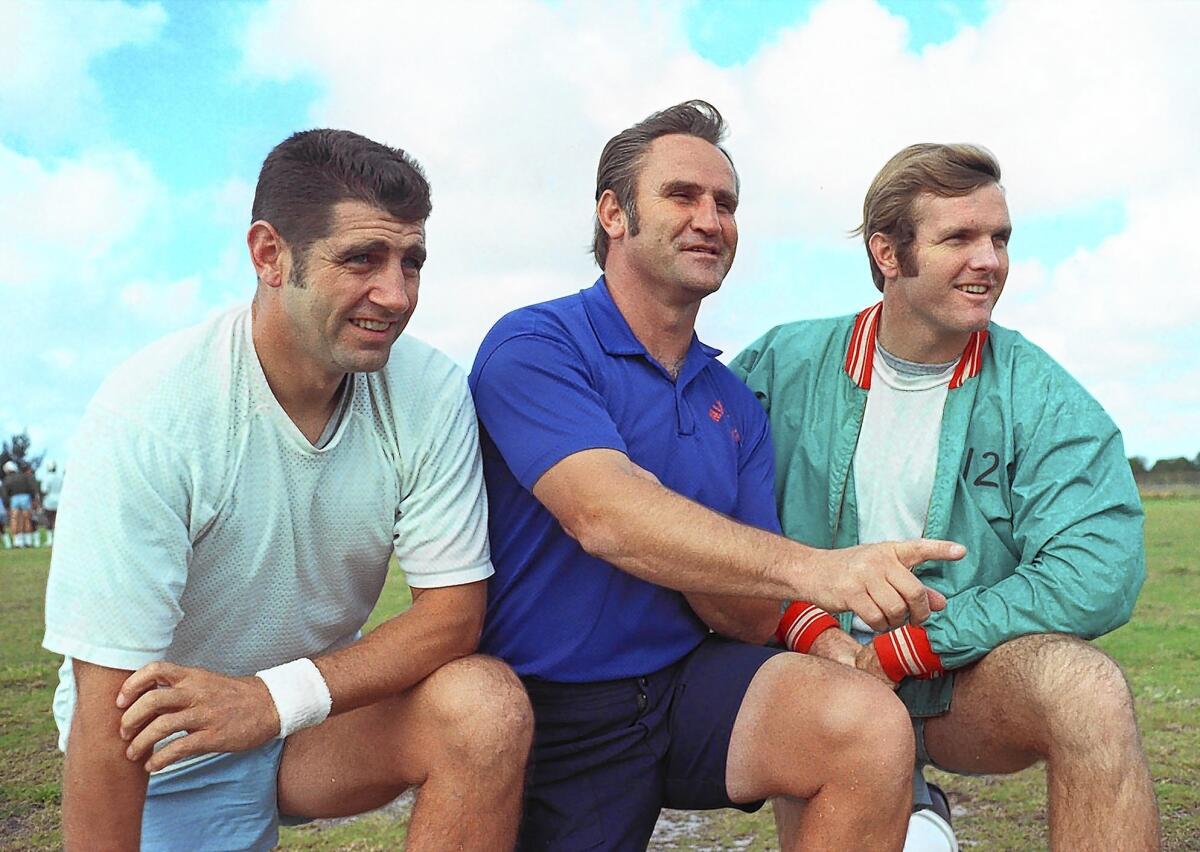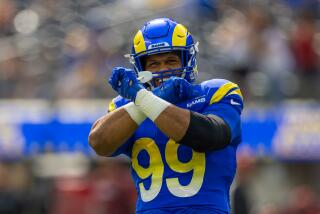Earl Morrall dies at 79; key NFL backup quarterback

Earl Morrall was the NFL’s answer to a brilliant Broadway understudy.
He left his mark on NFL history by stepping in for two future Hall of Fame quarterbacks — Johnny Unitas in Baltimore and Bob Griese in Miami — and turning in a string of masterful performances to keep his teams on track.
“All Earl ever did was win games for me, whether it was as a starter or coming off the bench,” said legendary Miami coach Don Shula, whose 1972 Dolphins finished with an unblemished 17-0 record — the only perfect season in the NFL’s modern era — thanks in large part to Morrall.
Morrall, who had been in failing health for some time and reportedly suffered from Parkinson’s disease, died Friday in Fort Lauderdale, Fla. He was 79.
Born May 17, 1934, in Muskegon, Mich., Earl Edwin Morrall was a star in football, basketball and baseball in high school, earning a football scholarship to Michigan State. He led the Spartans to a victory over UCLA in the 1954 Rose Bowl.
A first-round pick by San Francisco in 1956, Morrall played for six teams in a career that spanned 21 seasons. He did far more than hold a clipboard, throwing for 20,809 yards and 161 touchdowns, and winning the NFL’s Most Valuable Player award in 1968 when he filled in for the injured Unitas for an entire season.
But Morrall is best known for his contribution to the 1972 Dolphins, who lost Griese to leg and ankle injuries in the fifth game of that season. Morrall stepped in and helped the 4-0 team win its next 10 games to finish the regular season 14-0. His numbers weren’t eye-popping — he threw for 11 touchdowns during that span — but he was a steady hand for a running team that leaned heavily on backs Larry Csonka and Mercury Morris.
“If you lose Tom Brady, if you lose Peyton Manning, how many teams would be able to not only continue to win, but win all of your games?” said Hall of Fame receiver Paul Warfield, a star on that Dolphins team. “The moment that Earl stepped into the huddle, and I remember it very vividly, you knew with the command in his voice that he’d been there before. You knew that we were going to keep rolling, and that’s the way it turned out.”
In the 1972 playoffs, Morrall guided Miami to a victory over Cleveland but was replaced by Griese after the Dolphins fell behind to Pittsburgh in the AFC title game. When Miami prevailed to advance to the Super Bowl, Shula made the decision to start Griese in the finale.
“That probably had to be the toughest decision that I had to make in my coaching career,” Shula told The Times in a phone interview. “Griese was our quarterback of the future. He got hurt, and Earl was brought in as a stopgap and did a great job. But thinking of the future of the team, I knew I had to go back to Bob.
“I called Earl in and told him what my thoughts were, and he said, ‘Coach, I don’t agree with it. But I’ll be ready if and when you need me.’ That says it all about what kind of guy he was.”
That wasn’t the first time Shula turned to Morrall to bail his football team out of a jam.
In 1968, when Shula was coach of the Baltimore Colts, he lost the superstar Unitas to an elbow injury in an exhibition game. Shula handed the ball to Morrall, who led Baltimore to a 13-1 record in the regular season and two playoff victories.
In the Super Bowl, however, the upstart New York Jets intercepted three of Morrall’s passes and pulled off a stunning 16-7 victory, a major coup for the American Football League.
Two years later — with Shula in Miami and Don McCafferty head coach of the Colts — Morrall atoned for that wobbly performance on football’s biggest stage. In Super Bowl V against Dallas, after Unitas had to leave the game with bruised ribs in the second quarter, Morrall took over and directed Baltimore to a 16-13 victory.
Like his buzz cut, which he kept into the 1970s when longer hair was in fashion, Morrall was a throwback to a older, strait-laced era.
“The thing to understand about Earl Morrall,” Times columnist Jim Murray wrote, “is that it’s not only a name, it’s a description. Like a Horatio Alger hero, the name fits the character. He could be ‘Ned Earnest,’ or ‘Peter Pluck,’ or ‘Ron Loyal,’ but he’s ‘Earl Morrall.’ ”
Morrall is survived by his wife, Jane, sons Matthew and Mitchell; daughters Mardi Donahoe, Mindi Morrall-Ansley and Megan Leiti; and nine grandchildren.
More to Read
Start your day right
Sign up for Essential California for the L.A. Times biggest news, features and recommendations in your inbox six days a week.
You may occasionally receive promotional content from the Los Angeles Times.







